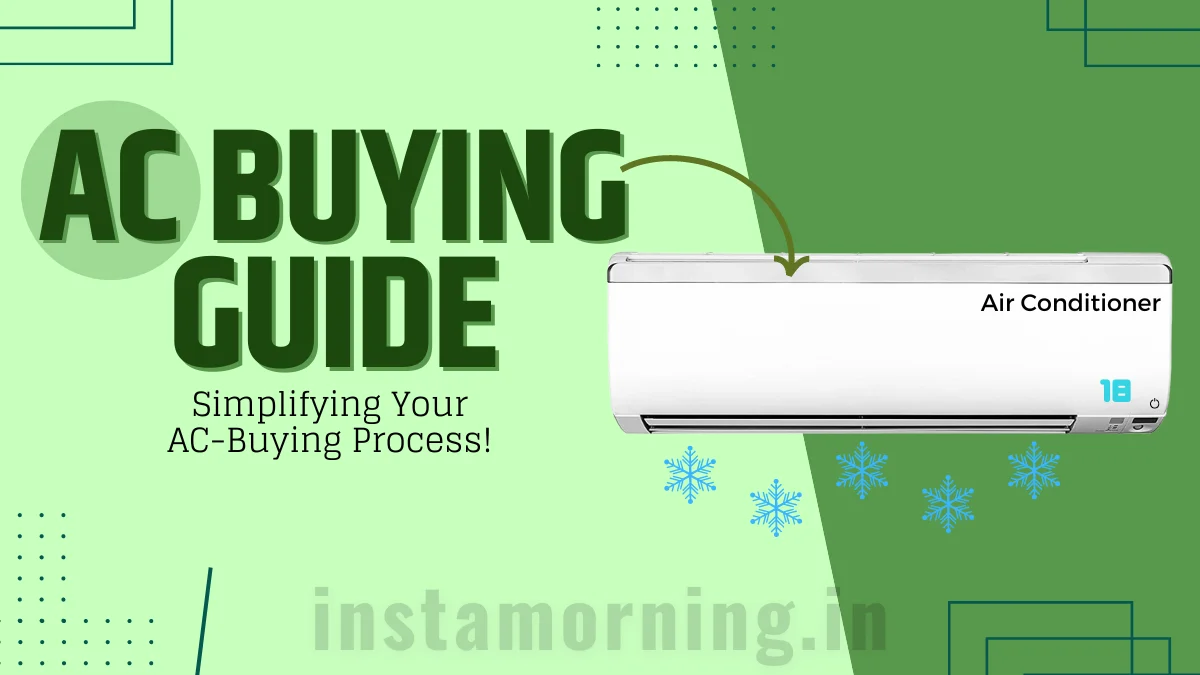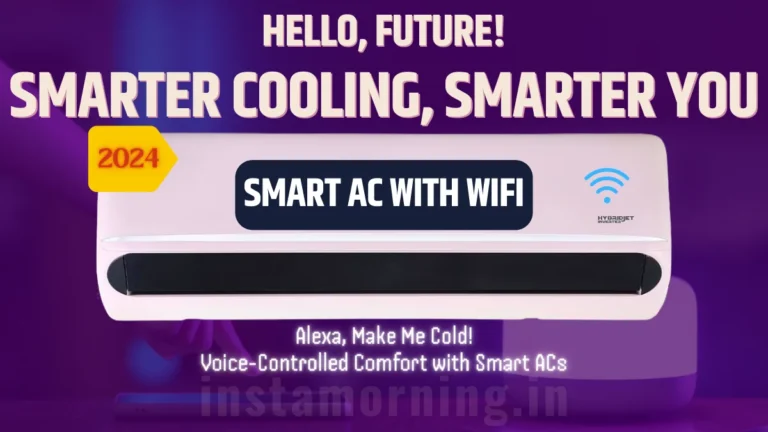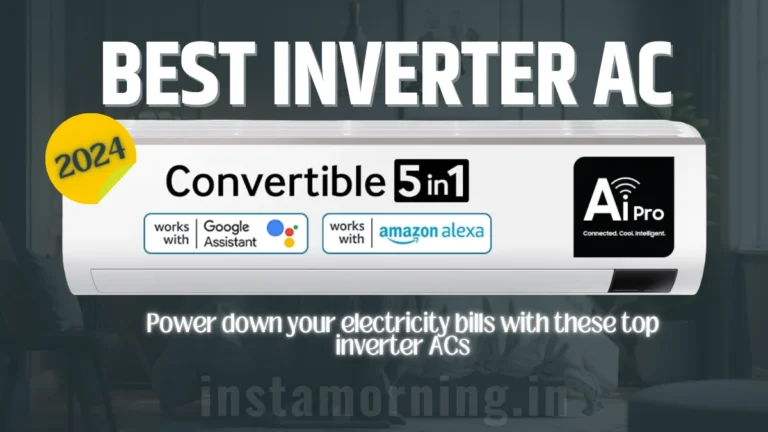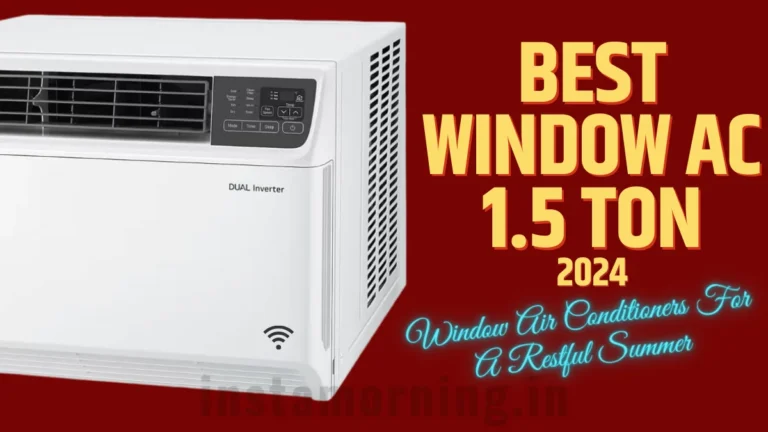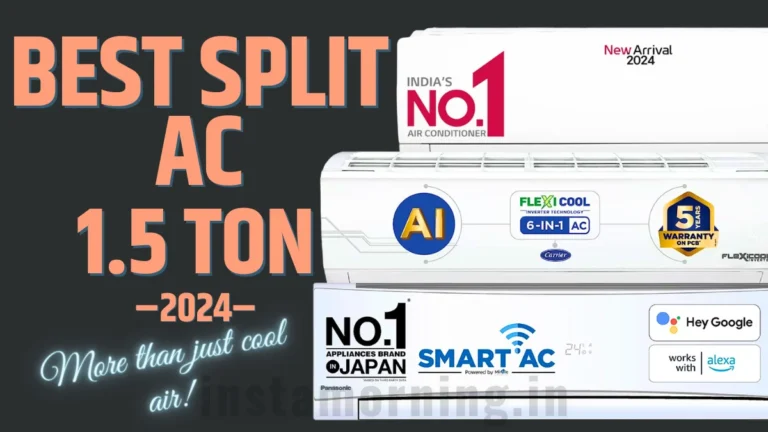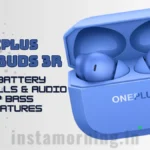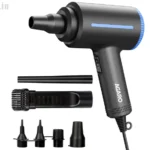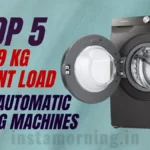Confused! Which AC to buy for your home this year? Worry not, we can make it easier for you. Buying a new AC is not as complex as you think. Your essential AC Buying Guide by InstaMorning is here.
Are you planning to upgrade your home with a new air conditioner this year? Before you dive into the world of cooling technology, consider this: selecting the perfect AC that aligns with your specific needs is more complex than it seems.
With technology evolving at a rapid pace, each year introduces new models brimming with advanced features, making the decision-making process more intricate than ever. But fear not, because we’re here to guide you through the maze of options.
InstaMorning, your go-to source for shopping advice, has expertly curated a buying guide on air conditioners. We’ve taken into account all the essential aspects, from seamless installation to hassle-free maintenance, ensuring you make an informed selection when you are out buying a modern air conditioner.
Let us simplify the process and make your journey to a cooler home a breeze.
Key Factors For Choosing The Best Air Conditioner
Before buying a new AC, these are the factors to keep in mind:
- Cooling Capacity: Match the AC’s capacity, measured in Tons or BTU (British Thermal Unit), to your room size. Consider factors like ceiling height, windows, and insulation. Overpowering AC wastes energy, while underpowered one won’t cool effectively.
- Energy Efficiency: Look for ACs with high ISEER (Indian Seasonal Energy Efficiency Ratio) ratings. Higher ISEER means lower electricity bills and reduced environmental impact. Consider inverter ACs for even better efficiency.
- Climate and Cooling Type: Choose an AC type suited to India’s hot and humid climate. Split ACs are popular, but window ACs can be cost-effective for smaller rooms. Inverter ACs excel in fluctuating temperatures.
- Star Rating: Opt for ACs with higher star ratings by the Bureau of Energy Efficiency (BEE). These indicate better energy efficiency and lower running costs.
- Features: Consider features like auto-clean, sleep mode, timers, and filters that suit your needs. Mosquito-repellent or air purification functions can be valuable additions.
- Noise Level: Choose an AC with a low decibel (50 dB or lower) rating for quieter operation, especially important for bedrooms. Look for models with silent mode or sleep mode features.
- Brand and Service: Choose a reputable brand with a good service network in India. Ensure easy access to spare parts and after-sales service for peace of mind.
- Budget: ACs come in various price ranges. Set a realistic budget and compare models within your range that offer the best combination of features and efficiency.
- Installation and Maintenance: Consider installation costs and ease of maintenance. Choose an AC with readily available technicians in your area for hassle-free installation and timely service.
- Personal Preferences: Think about your individual needs and preferences. Do you prioritize quiet operation, smart features, or energy efficiency? Choose an AC that ticks your boxes.
What is a Ton in AC?
Choosing the right air conditioner tonnage is crucial for efficient cooling and optimal comfort in India’s hot and humid climate. But what exactly is “Air Conditioning Tonnage,” and how do you determine the right size for your needs?
A “Ton” in air conditioning refers to the heat removal capacity of the unit. It’s not about weight, but rather the ability to remove heat equivalent to melting One Ton (1000 Kg) of ice in 24 hours.
So, a 1-ton AC can remove heat equivalent to melting 1 ton of ice per day, a 1.5-ton AC can remove 1.5 tons of ice per day, and so on.
How To Determine The Right Tonnage For Your AC?
The ideal tonnage for your AC depends on several factors, including:
- Room size: The larger the room, the higher the tonnage needed. As a general rule, a 1-ton AC is suitable for rooms up to 120 sq ft, a 1.5-ton AC for 140-160 sq ft, and so on.
- Climate: In hotter regions like Rajasthan, you might need a higher tonnage AC compared to cooler areas like Himachal Pradesh.
- Occupancy: More people in the room generate more heat, so factor in the usual number of occupants when choosing tonnage.
- Appliance Heat Gain: Appliances like TVs and computers also generate heat, so consider their presence in the room and go for a higher tonnage.
- Building Insulation: Well-insulated buildings require less cooling power, so you might need a slightly lower tonnage AC.
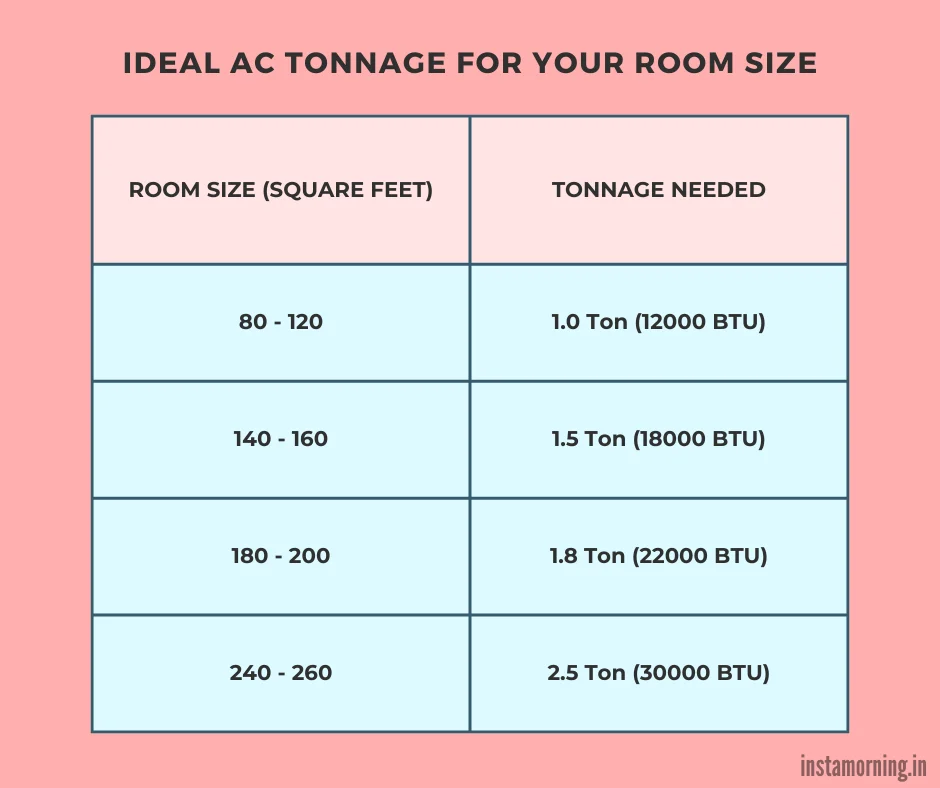
Split AC vs Window AC
The two most common types of air conditioners in India are Split ACs and Window ACs. They both have their own pros and cons, so it’s important to understand the differences before making a purchase.
Split ACs
Design and Installation
Split ACs consist of two units – an indoor unit that houses the evaporator coil and blower fan, and an outdoor unit that houses the compressor and condenser coil. The units are connected by refrigerant lines that run through a small hole in the wall. This allows for a more flexible placement of the indoor unit and keeps the noisy compressor outside.
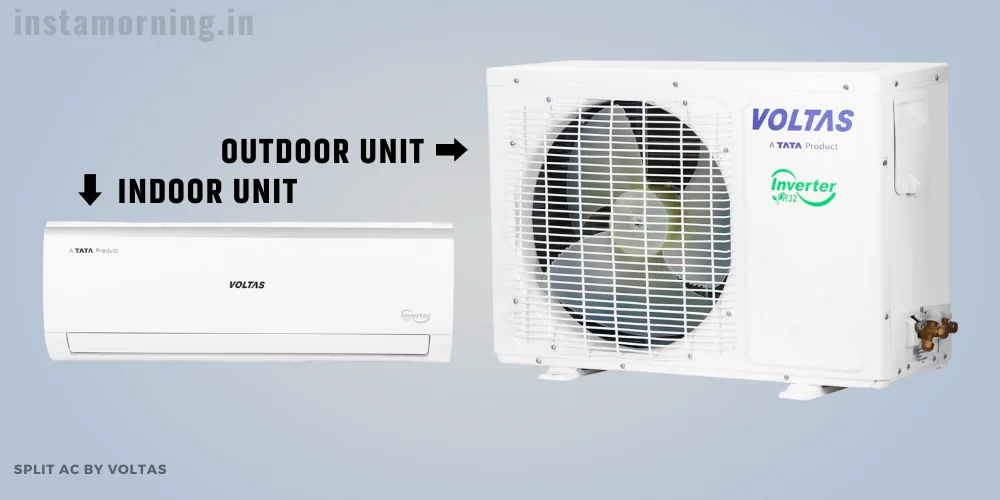
Cooling Capacity and Efficiency
Split ACs generally have higher cooling capacities and are more energy-efficient than window ACs. This is because the compressor, the most heat-producing and energy-consuming part of the unit, is outside.
Noise Level
Split ACs are much quieter than window ACs. This is because the noisy compressor is located outside the house.
Cost
Split ACs are more expensive than window ACs, due to their more complex design and installation.
Suitability
Split ACs are a good choice for larger rooms, multiple rooms, or homes with strict noise requirements. They are also more aesthetically pleasing as the indoor unit can be mounted on a wall.
Check Out — Best 1.5 Ton Split AC
Window ACs
Design and Installation
Window ACs are single, self-contained units that are installed in a window frame. They are more compact and easier to install, but they block the window and can be quite noisy.
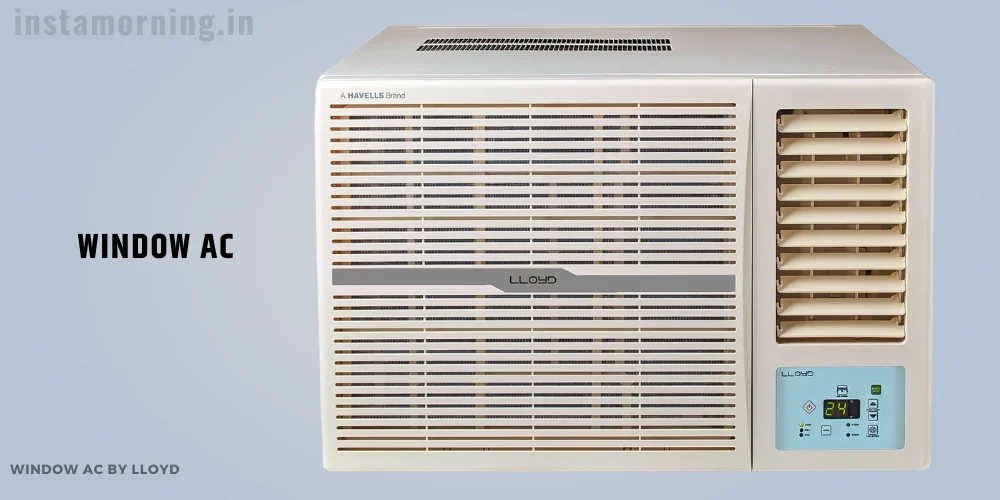
Cooling Capacity and Efficiency
Window ACs have lower cooling capacities and are less energy-efficient. This is because the compressor is located inside the unit, generating heat that can make the room even warmer.
Noise Level
Window ACs are quite noisy, as the compressor is located inside the unit and close to the occupants.
Cost
Window ACs are more affordable than split ACs, but their lower efficiency can lead to higher running costs in the long run.
Suitability
Window ACs are a good choice for small rooms or temporary cooling needs. They are also a good option for renters who are not allowed to make permanent changes to the property.
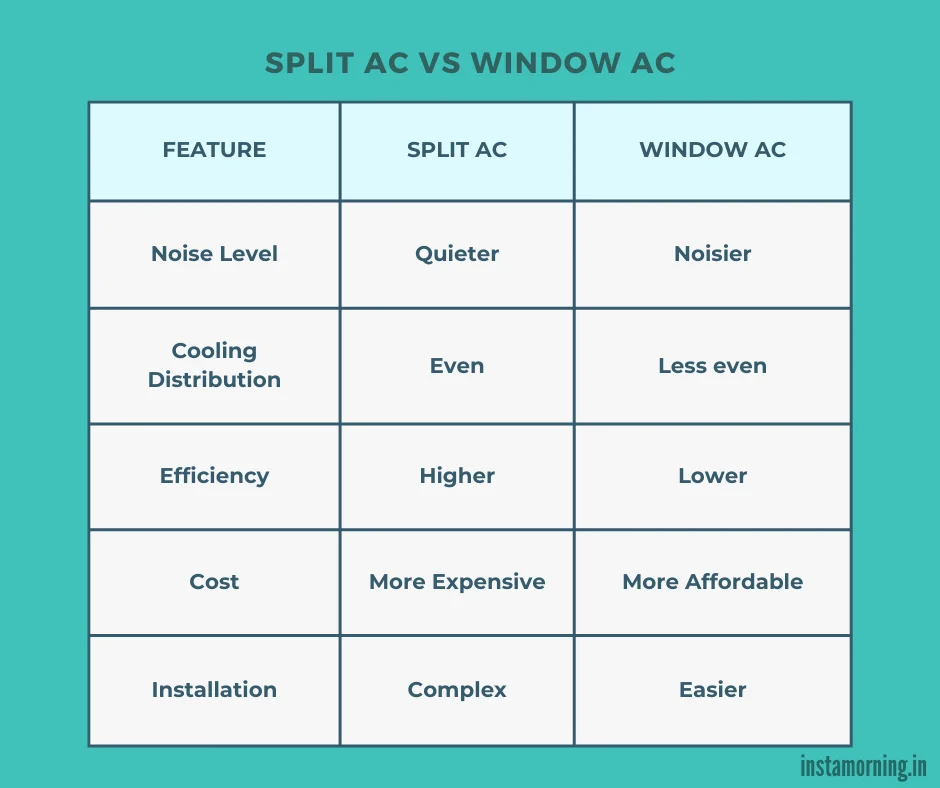
Also Read — Best Window AC 1.5 Ton
AC Inverter Technology
An Inverter Air Conditioner (AC) is an innovative technology designed to enhance energy efficiency and temperature control. Unlike traditional AC units, inverter ACs employ a variable-speed compressor that adjusts its rotational speed to meet the desired cooling requirements.
This eliminates the need for frequent starts and stops, ensuring a more stable and energy-efficient operation. The inverter technology allows for precise modulation of cooling capacity, responding dynamically to changes in room temperature.
By continuously regulating the compressor speed, inverter ACs maintain a consistent and comfortable indoor environment while optimizing energy consumption.
This technology not only enhances cooling performance but also contributes to significant energy savings, making inverter ACs a modern and eco-friendly solution for maintaining thermal comfort in residential and commercial spaces.
Also Read — Best Inverter ACs In India
Inverter AC is a technology that revolutionizes air conditioning by using a variable-speed compressor, unlike traditional on/off systems. It works by:
Starting at high speed: Quickly cool the room to your desired temperature.
Smartly adjusting: Maintains temperature by slowing down the compressor instead of turning it off completely. This avoids energy-guzzling restarts.
Precise cooling: Minimizes temperature fluctuations, ensuring consistent comfort without chills or blasts.
Difference Between Inverter and Non-Inverter AC
The main difference between Inverter and Non-Inverter ACs lies in their compressor. Inverter ACs have a variable speed compressor, allowing them to adjust the motor speed based on temperature requirements.
This makes them more energy-efficient and quieter than Non-Inverter ACs, which have a fixed speed compressor operating in an on/off method. Inverter ACs use pulse width modulation for cooling, providing better temperature control and faster cooling.
Additionally, Inverter ACs are more environmentally friendly, using efficient refrigerants. While Inverter ACs cost more upfront, they save on electricity bills over time and have a longer lifespan, making them a preferred choice for those prioritizing energy efficiency and durability.
Types Of Inverter AC Technologies
There are five main types of inverter AC technologies, each with its own advantages and features:
Dual Inverter AC Technology
- Uses two rotors for compression, reducing noise and vibration.
- Offers variable speed operation for both energy saving and quick cooling.
Triple Inverter AC Technology
- Employs a single, advanced Digital 8 pole motor for efficient and smooth operation.
- Minimizes torque variation, improving compressor and condenser durability.
Intellisense Inverter AC Technology:
- Adapts compressor operation to environmental factors like humidity and temperature.
- Features smart communication between indoor and outdoor units for precise temperature control.
Two-Stage Steady Cool Compressor AC Technology
- Uses two-stage compression for efficient low-temperature cooling.
- Operates across a wider temperature range compared to single-stage compressors.
Flexicool HybridJet Inverter AC Technology:
- Modifies airflow architecture for cleaner and cooler air output.
- Employs independent refrigerant cooling for improved inverter lifespan and performance.
Benefits Of Inverter ACs
The major benefits of Inverter ACs are as follows:
Energy Efficiency: Inverter ACs use less power compared to traditional ACs by regulating the compressor speed.
Stable Voltage Operation: They effectively handle voltage changes, ensuring steady operation even during power supply fluctuations.
Steady Room Temperature: Inverter technology maintains a consistent room temperature, avoiding sudden shifts and providing superior comfort.
Effective Cooling: These ACs efficiently and quickly cool spaces of various sizes.
Versatility: Inverter ACs adapt well to different room sizes, making them suitable for various spaces.
Safety for Homes: Lower power consumption makes them safer for residential electrical systems, minimizing potential risks.
Environmentally Friendly: Adjustable compressor speed reduces energy usage, making inverter ACs a greener choice for environmental consciousness.
The choice of inverter AC technology depends on your specific needs and priorities. Consider factors like budget, desired cooling speed, noise level, and environmental impact when making your decision.
Climate Specific Air Conditioners
Having an air conditioner (AC) is often not a luxury, but a necessity. Select an air conditioner that aligns with the specific climate conditions.
ACs for Hot and Humid Indian Summers
India’s summers are notoriously hot and humid, with temperatures soaring well above 40°C (104°F) and humidity levels reaching up to 80%. This scorching combination can make life miserable, impacting health, productivity, and overall well-being. This is where air conditioners (ACs) come in as lifesavers, transforming sweltering spaces into cool oases of comfort.
Hot & Cold ACs (All Weather ACs)
A Hot and Cold AC, also known as All Weather air conditioner, is an advanced air conditioning system that provides both heating and cooling functions within a single unit.
It operates through a reversible refrigeration cycle, extracting heat from the interior space during warmer months to cool it down and reversing the process during colder months to release heat indoors, ensuring a warm atmosphere.
Also Read — Best Hot And Cold Split AC In India
This dual functionality makes Hot and Cold ACs suitable for regions with distinct seasons, offering year-round comfort. They are praised for their energy efficiency, versatility, and the ability to address diverse climate conditions.
AC with Air Purifier
An air conditioner with an air purifier refers to an air conditioning unit that comes equipped with a built-in air purification filter. This filter is designed to capture and remove airborne irritants, allergens, and pollutants, providing not only cool air but also a cleaner and healthier indoor environment.
Also Read — Best AC With Air Purifier For Improving Indoor Air Quality
The air purifier within the AC helps eliminate dust, pollen, and other particles, contributing to improved air quality in the space where the AC is installed. These units are often considered beneficial for individuals looking to enhance both cooling and air purification in their homes or offices.

Advantages Of AC with Air Purifier
Air conditioners with air purifiers offer several advantages:
Reduced Allergies: The integrated air filter helps in reducing allergens, dust, and other particles in the air. This can be particularly beneficial for individuals suffering from allergies, asthma, or respiratory issues.
Healthier Living Environment: The cleaner air provided by the air purifier contributes to a healthier living environment. It can be especially helpful for children, as studies suggest that exposure to clean air may reduce the risk of chronic respiratory infections.
Elimination of Harmful Chemicals: Air purifiers not only filter out dust and allergens but also help eliminate harmful chemicals present in indoor environments, such as formaldehyde and benzene.
Improved Sleep Quality: The reduction of dust, odours, and other particles enhances the air quality, potentially leading to better sleep. This is important for avoiding allergies and respiratory issues during sleep.
Potential Increase in Life Expectancy: Breathing cleaner air through the use of air purifiers may contribute to a reduction in the risk of illnesses like asthma and allergies. This, in turn, could have a positive impact on overall health and potentially increase life expectancy.
Smart AC With WiFi
A Smart AC or AC with WiFi refers to an air conditioner equipped with wireless connectivity capabilities, allowing remote control and monitoring via a smartphone, tablet, or other internet-connected devices.
Also Read — Smart ACs - Best AC With WiFi In India
Through a dedicated app, users can manage various functions such as turning the AC on or off, adjusting temperature settings, changing fan speeds, and scheduling operations. Some Smart ACs also feature additional functionalities like voice control compatibility, geofencing for automatic adjustments based on location, energy monitoring, and air quality sensing.
These features offer increased convenience, energy efficiency, and customization options for modern households seeking smarter cooling solutions.
AC Star Rating
In India, the star rating system for air conditioners is a helpful tool to understand their energy efficiency. This rating is awarded by the Bureau of Energy Efficiency (BEE) and ranges from 1 to 5 stars, with higher stars indicating better efficiency and lower electricity consumption. Here’s a breakdown of the star rating system:
- 1 Star: These ACs are the least efficient and consume the most electricity. They are generally cheaper to buy but cost you more in the long run due to higher electricity bills.
- 2 Star: Slightly more efficient than 1-star models, but still not very energy-saving. They may be suitable for occasional use in small spaces.
- 3 Star: This is the minimum recommended rating for most homes in India. These ACs offer a good balance of affordability and efficiency, making them a popular choice.
- 4 Star: More energy-efficient than 3-star models, leading to lower electricity bills. They are a good option for frequent use or larger spaces.
- 5 Star: The most energy-efficient ACs available in India. They are the most expensive to buy initially, but their energy savings can significantly offset the cost over time, especially in areas with high electricity rates.

Best AC Brands
There are several top AC brands in India. Each brand offers a variety of models with different features, energy efficiency, and price ranges.
It’s recommended to consider factors such as reliability, energy efficiency, capacity, condenser type, cooling technology, features, and budget when choosing the best AC brand according to individual needs.
Here is a list of the top 10 AC brands in India:
- LG
- Panasonic
- Daikin
- Voltas
- Samsung
- Hitachi
- Blue Star
- Carrier
- Lloyd
- Godrej
These brands offer a range of models with varying features and pricing. The choice depends on individual preferences, budget and specific requirements such as room size, energy efficiency, and desired features.
It’s advisable to thoroughly compare models and consider customer reviews before making a purchase decision.
AC Price And Budget Options
The price of an AC in India can vary greatly, ranging from as low as ₹24,000 for a basic Window AC to over ₹75,000 for a top-of-the-line inverter split AC with advanced features. Several factors play a key role in determining the price tag:
Type of AC:
Window ACs: These are the most affordable, starting around ₹16,999, but they are less efficient and have lower cooling capacity than split ACs.
Split ACs: These are more expensive, typically starting around ₹26,000 for a basic 1-ton model, but they are quieter, more efficient, and offer better cooling. Split ACs further come in inverter and non-inverter varieties, with inverter models being significantly more expensive (around ₹34,000 for a 1-ton model) but offering superior energy savings.
Cooling capacity:
The larger the cooling capacity (measured in tons), the higher the price. A 1-ton AC will be cheaper than a 1.5-ton or 2-ton AC.
Brand and features:
Popular brands like LG, Voltas, and Samsung generally command a premium. Additionally, features like inverter technology, Wi-Fi connectivity, air purifiers, and advanced cooling modes all contribute to a higher price tag.
Energy efficiency rating:
ACs are rated on a 1-star to 5-star scale for energy efficiency, with 5-star models being the most efficient and therefore more expensive.
Season and discounts:
Prices may fluctuate during peak summer months, and discounts and offers are common during festive seasons or online sales.
So, to give you a precise answer about the price, it’s crucial to consider your specific needs and preferences. If you’re on a tight budget and only need basic cooling for a small room, a window AC could be a good option.
But if you prioritize energy efficiency, quiet operation, and powerful cooling for a larger space, an inverter split AC might be the better choice, albeit at a higher cost.
New AC Buying Tips
Follow these tips before you buy a new AC:
Know Your Space
Measure the square footage for accurate BTU capacity (20-30 BTU per square foot).
Consider sun exposure, as south-facing rooms may need higher capacity.
Types of AC
Window ACs: Affordable and easy for small spaces.
Split ACs: Quieter, more efficient, and powerful for larger areas.
AC Copper Coil vs Aluminum
The choice between an AC copper coil and an aluminium coil often depends on specific factors and preferences. Here’s a breakdown of the characteristics of each to help you understand the comparison:
AC Copper Coil
- Copper is an excellent conductor of heat, allowing for efficient heat transfer. This results in better cooling performance.
- Copper coils are generally more durable and less prone to corrosion compared to aluminium. This can contribute to a longer lifespan for the AC unit.
- Copper coils are easier to repair, and in case of damage, repairs are often more straightforward compared to aluminium.
- Copper is a more expensive material, which can make AC units with copper coils relatively more expensive upfront.
AC Aluminum Coil
- Aluminium is lighter than copper, making AC units with aluminium coils lighter and potentially easier to handle during installation.
- Aluminium is less expensive than copper, making AC units with aluminium coils generally more cost-effective upfront.
- While aluminium is more prone to corrosion than copper, modern coatings and technologies have improved the corrosion resistance of aluminium coils.
- Aluminum has a slightly lower heat transfer efficiency compared to copper. However, advancements in design and technology aim to mitigate this difference.
Which is Better?
- Copper coils tend to offer better heat transfer efficiency, contributing to more effective cooling.
- Aluminium coils are generally more cost-effective, making AC units with aluminium coils more budget-friendly upfront.
- Copper coils are known for their durability and resistance to corrosion, potentially offering a longer lifespan.
AC Noise Levels
The noise level of an AC unit is measured in decibels (dB). A whisper is about 30 dB, while a normal conversation is about 60 dB. Most AC units operate between 40 and 60 dB, with some quieter models reaching as low as 19 dB.
Feature Focus
Inverter Magic: Adjusts power output, saving energy and reducing noise.
Smart Cool: Wi-Fi-enabled for remote control.
Air Quality: Some have HEPA filters or air purifiers.
Budget Considerations
Star Power: Look for high energy efficiency ratings (3 stars or more).
Seasonal Steals: Consider buying during the off-season (fall and winter).
Comparison and Shopping
Compare prices and features online and in-store.
Seek professional help for sizing and installation, especially for complex systems.
Maintenance Cost and Eco-conscious Tips
Schedule regular maintenance for efficiency.
Basic servicing costs around ₹300-700. Deeper cleaning and Gas Refill might cost more, ranging from ₹1499 to ₹2500.
Opt for energy-efficient models.
Use the AC responsibly to minimize environmental impact.
With these tips, you can confidently choose the right AC for your needs and stay cool throughout the summer.
Final Thoughts
By following this comprehensive AC buying guide, you can confidently choose the ideal air conditioner for your home, whether it’s a Window AC, Split AC, Portable AC, or Hot and Cold AC.
This guide thoroughly addresses crucial factors to consider before making a decision. If you found this guide helpful, please share it with your friends and family.
We trust it has assisted you in selecting the right AC. If any questions or uncertainties remain unanswered, feel free to drop a comment, and we will make every effort to provide clarification.
Disclaimer: This article may contain affiliate links. If you purchase after clicking on them, InstaMorning may earn a small commission at no extra cost to you. Also note, that the mentioned products are picked on user ratings and InstaMorning is not responsible for the after-sale service of any products.

